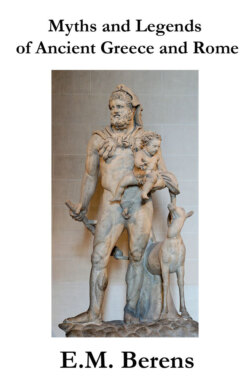Читать книгу Myths And Legends Of Ancient Greece And Rome - E.M. Berens - Страница 11
На сайте Литреса книга снята с продажи.
THIRD DYNASTY—OLYMPIAN DIVINITIES. ZEUS[11] (Jupiter).
ОглавлениеZeus, the great presiding deity of the universe, the ruler of heaven and earth, was regarded by the Greeks, first, as the god of all aërial phenomena; secondly, as the personification of the laws of nature; thirdly, as lord of state-life; and fourthly, as the father of gods and men.
As the god of aërial phenomena he could, by shaking his ægis,[12] produce storms, tempests, and intense darkness. At his command the mighty thunder rolls, the lightning flashes, and the clouds open and pour forth their refreshing streams to fructify the earth.
As the personification of the operations of nature, he represents those grand laws of unchanging and harmonious order, by which not only the physical but also the moral world is governed. Hence he is the god of regulated time as marked by the changing seasons, and by the regular succession of day and night, in contradistinction to his father Cronus, who represents time absolutely, i.e. eternity.
As the lord of state-life, he is the founder of kingly power, the upholder of all institutions connected with the state, and the special friend and patron of princes, whom he guards and assists with his advice and counsel. He protects the assembly of the people, and, in fact, watches over the welfare of the whole community.
As the father of the gods, Zeus sees that each deity performs his or her individual duty, punishes their misdeeds, settles their disputes, and acts towards them on all occasions as their all-knowing counsellor and mighty friend.
As the father of men, he takes a paternal interest in the actions and well-being of mortals. He watches over them with tender solicitude, rewarding truth, charity, and uprightness, but severely punishing perjury, cruelty, and want of hospitality. Even the poorest and most forlorn wanderer finds in him a powerful advocate, for he, by a wise and merciful dispensation, ordains that the mighty ones of the earth should succour their distressed and needy brethren.
The Greeks believed that the home of this their mighty and all-powerful deity was on the top of Mount Olympus, that high and lofty mountain between Thessaly and Macedon, whose summit, wrapt in clouds and mist, was hidden from mortal view. It was supposed that this mysterious region, which even a bird could not reach, extended beyond the clouds right into Aether, the realm of the immortal gods. The poets describe this ethereal atmosphere as bright, glistening, and refreshing, exercising a peculiar, gladdening influence over the minds and hearts of those privileged beings permitted to share its delights. Here youth never ages, and the passing years leave no traces on its favoured inhabitants. On the cloud-capped summit of Olympus was the palace of Zeus and Hera, of burnished gold, chased silver, and gleaming ivory. Lower down were the homes of the other gods, which, though less commanding in position and size, were yet similar to that of Zeus in design and workmanship, all being the work of the divine artist Hephæstus. Below these were other palaces of silver, ebony, ivory, or burnished brass, where the Heroes, or Demi-gods, resided.
As the worship of Zeus formed so important a feature in the religion of the Greeks, his statues were necessarily both numerous and magnificent. He is usually represented as a man of noble and imposing mien, his countenance expressing all the lofty majesty of the omnipotent ruler of the universe, combined with the gracious, yet serious, benignity of the father and friend of mankind. He may be recognized by his rich flowing beard, and the thick masses of hair, which rise straight from the high and intellectual forehead and fall to his shoulders in clustering locks. The nose is large and finely formed, and the slightly-opened lips impart an air of sympathetic kindliness which invites confidence. He is always accompanied by an eagle, which either surmounts his sceptre, or sits at his feet; he generally bears in his uplifted hand a sheaf of thunderbolts, just ready to be hurled, whilst in the other he holds the lightning. The head is frequently encircled with a wreath of oak-leaves.
